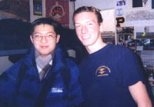It won't be hard to spot the friends of David Li on campus today.
They'll be wearing light blue t-shirts with the logo Marrow Drive '99 and Mr. Li's name on the back. They are the ones who organized and sponsored two bone marrow drives last year in an unsuccessful attempt to find a match for Mr. Li, Class of 2002, who suffered from acute lymphoblastic leukemia. The 20-year-old Mr. Li died on August 7.
Mr. Li was diagnosed with leukemia as a sophomore at Peter Stuyvesant High School in New York. He continued to attend classes while undergoing two years of chemotherapy, and graduated on time. The disease was in remission when he entered MIT in September 1998, but he had to withdraw after a semester when the leukemia returned.
Knowing a bone marrow transplant was his only hope, friends at MIT organized two searches for a match, in November and February, mindful that the chances of success were miniscule. The odds of finding a match range from 20,000-to-1 to 1,000,000-to-1. Aware of this, Mr. Li told his friends: "Don't do this for me, because chances are very slim that you'll be a match for me. Do this for your sense of charity and humanity.'"
A total of 664 students, faculty and staff registered with the National Marrow Donor Program (NMDP) as a result of the MIT efforts, none of them a complete match for Mr. Li. The two drives concentrated on testing Asians, Pacific Islanders, Africans, Hispanics, Native Americans and persons of mixed ethnicity because of the shortage of donors from those groups.
Mr. Li died of a lung infection in New York Hospital. The funeral was in Brooklyn on August 16. He is survived by his parents and a younger sister, all of whom live in Brooklyn.
"I hope we will keep his spirit alive in our hearts and in our dedication to fighting leukemia," said Susan Dacy, a graduate tutor at Burton Conner who helped coordinate both drives.
Residents of Burton 2 where he lived and other friends have been sharing memories of Mr. Li. Even after he left MIT, friends said Mr. Li kept himself busy and his brain challenged. He read Schopenhauer, Yeats and Dostoyevsky as well as Angela's Ashes and other contemporary fiction. He scoured magazines and newspapers and peppered his friends with ironic asides and interesting clips.
He converted the architecture of his home computer so he could access Athena more easily and communicate with his friends, and he searched scientific web sites to learn about an eclectic variety of subjects -- from jet turbines to cloning sheep.
Mr. Li learned the entire 18.03 (Differential Equations) curriculum on his own so he'd be eligible to take advanced courses when he returned to MIT. In addition, he wrote a retrospective novella reflecting on some of his first-term adventures and antics.
Here are some of his friend's recollections:
Joshua A. Goldwitz, a junior in mechanical engineering who occasionally traveled by subway to high school with Mr. Li and became closer to his fellow Brooklynite when they arrived at MIT: "Dave was always optimistic that he would return to MIT. He had no interest in going to school in New York where he had to remain for medical treatment. He was driven to continue learning and developing his mind even at home. He borrowed some of my textbooks and would also read other books and surf the Internet. When I went home for breaks, we would catch up and usually get dim sum in Chinatown."
Grant Kristofek, a junior in mechanical engineering, met Mr. Li during freshman orientation and shared a room with him. He remembers Mr. Li as friendly, bright and witty. "Nothing could escape the trap that was his mind. Dave was always thinking. He utilized his remarkable intellect to ace his intense first-term load, to shepherd me and other friends through those difficult social issues that freshmen face, to quip witty remarks that brought everyone around him to the floor with laughter, and more than anything, to keep himself from becoming bored. Until his last, I don't think Dave was ever bored. He wouldn't stand for it. His life was brief yet full of conviction, purpose, brilliance. His spirit will live on in all of us."
Daniel Kwon, Mr. Li's other roommate, a junior in aeronautics and astronautics, met him at the egg drop contest during orientation. In addition to Mr. Li's intelligence and wit, Mr. Kwon remembers him as a raconteur, a chef and a proud New Yorker. "A bunch of guys on the floor decided to make a Thanksgiving turkey to test our cooking skills. We each were assigned to contribute one food item. Well, it turned out that Dave basically ran the show, cooking the entire turkey, stuffing and all. It was one of my best meals at MIT. He loved New York; he loved riding the subway and showing me around Chinatown. It amazed me how much he knew and was interested in learning. He'd talk about quantum computers or M theory or neutrinos with so much hope that everything was feasible, it was just a matter of time."
Vijay Divi, a junior in electrical engineering and computer science, remembers Mr. Li's compassion and understanding. "He tried to understand the positions of each of his friends and helped all of them. Being one of the only people I could really talk to, he helped me through some of my toughest times my first semester at MIT." He, too, has fond memories of Thanksgiving in the dormitory. "We ate for hours, talked for hours and laughed for hours. The most amazing thing that I will forever admire Dave for is his altruistic personality. The most important idea he instilled in all his friends is the power of helping. He showed us how important it is to help those around us."
A version of this article appeared in MIT Tech Talk on September 13, 2000.






